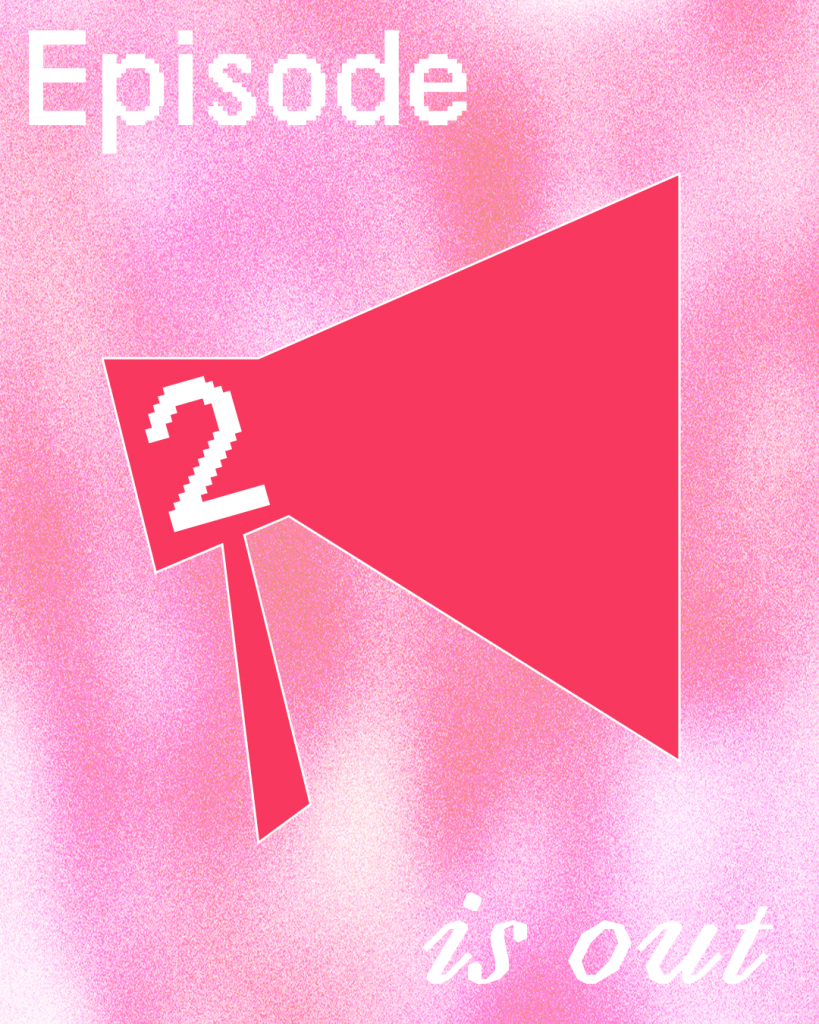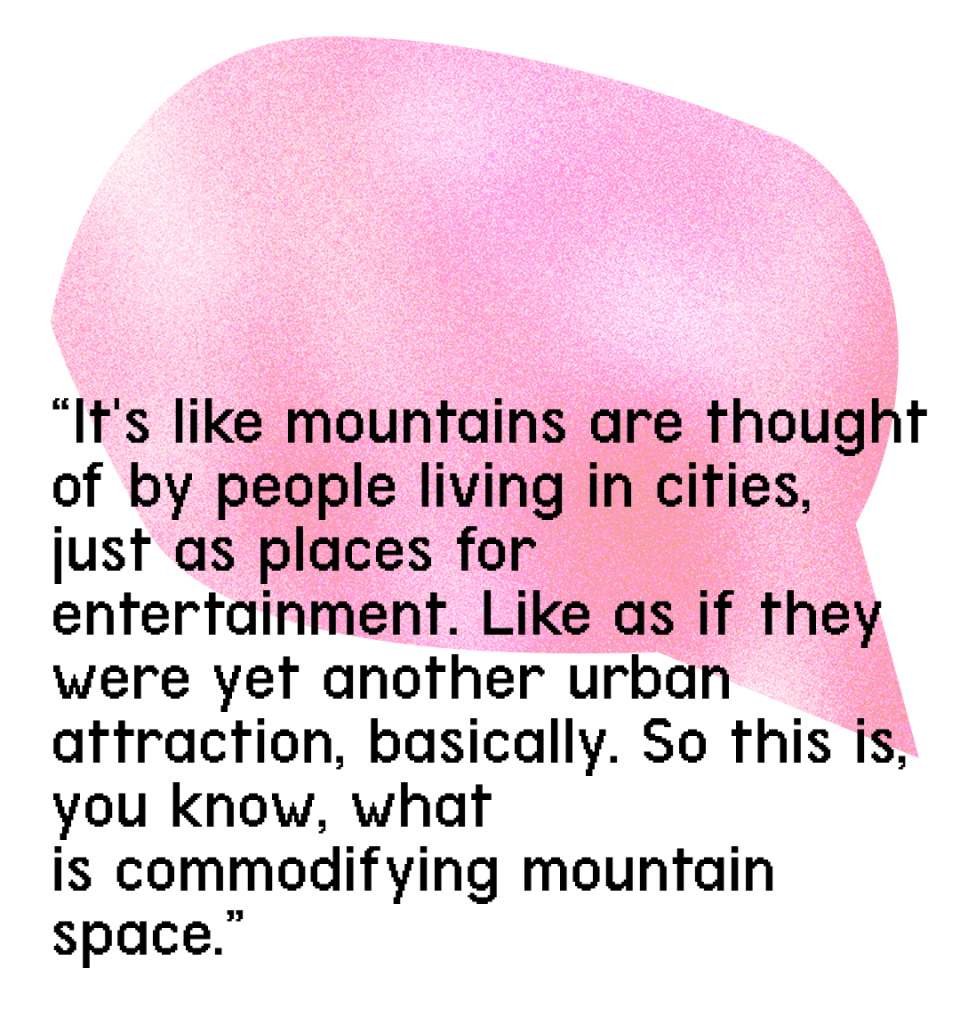
S2425 / CYCLE 2 / EPISODE 2
Mountains of Spectacle: Questioning the Sustainability of Tourism and Mega Events
Written by Dafni Riga, Abdallah Jreij and Toka Elsayed
This episode explores mountain territories as places of production, leisure, and spectacle. Considering practices of mass tourism and mega events as major drivers of spatial transformation, the episode critically explores their sustainability—not only environmentally, but also spatially, socially, and economically.
Drawing insights from the work of Martin Müller and Sarah Gainsforth, the episode addresses the material and immaterial effects of such leisure practices in mountain territories through a threefold perspective: firstly, in spatial and tangible terms; secondly, in terms of governance; and thirdly, in terms of the intangible human experience. By reflecting on the above, the episode seeks to highlight the fact that mountains are increasingly undergoing processes of urbanisation, especially in the context of tourism and mega events. Ultimately, it constitutes a call for defending, protecting, and preserving our mountain landscapes.
Subscribe on your favorite platform

Guests
Sarah Gainsforth
Sarah Gainsforth is an independent researcher, non-fiction writer, and freelance journalist based in Rome. Her work explores housing policies, urban transformation, and socio-territorial inequalities in Italy, drawing on urban studies, sociology, and critical geography. She regularly writes for Internazionale and Il Manifesto.
Her publications include Airbnb città merce (DeriveApprodi, 2019), finalist for the Premio Napoli 2020, and Abitare stanca (Effequ, 2022), winner of the Giulio Angioni Prize for Non-Fiction 2023. She has also contributed to volumes such as The Last Grand Tour (Park Books, 2023) and reports on housing for Caritas Italiana.
Martin Müller
Martin Müller is Professor of Geography and Sustainability at the University of Lausanne, where he leads the M3 research group (Materialities | Multiplicities | Metropolis). His work explores the urban dimension of the sustainability transition, focusing on cultural institutions, major sports events, and the geopolitics of geographical knowledge, particularly in relation to the Global Easts. He holds a PhD in Human Geography from Goethe University Frankfurt and a Master’s in Development Studies from the University of Cambridge. He has held fellowships at institutions including UBC, UNC Chapel Hill, Oxford, VUB, and the Institute for Advanced Study in Marseille, and was previously a Swiss National Science Foundation Professor at the University of Zurich.
He is an international expert on the sustainability of mega-events and cultural institutions, he has contributed to ICOM and CiMAM, and is frequently cited in media such as The Economist, New York Times, BBC, and Der Spiegel. He writes regularly for outlets like DIE ZEIT, NZZ, and Le Temps. Müller speaks English, German, and French, and his work has been translated into multiple languages.
Resources
Suggested readings
Butler, R. (2021). Measuring tourism success: alternative considerations. Worldwide Hospitality and Tourism Themes, 14(1), 11–19. https://doi.org/10.1108/whatt-10-2021-0133
Calzati, V., & de Salvo, P. (2018). Slow tourism. A theoretical framework. In M. Clancy (Ed.), Slow Tourism, Food and Cities. Pace and the Search for the “Good Life” (pp. 33–48). Routledge.
Campisi, J., & Ulary, G. (2023). Travelling, Fast and Slow. In M.É., Zovko & J. Dillon (Eds.), Tourism and Culture in Philosophical Perspective (pp.189–200). Springer. https://doi.org/10.1007/978-3-031-36659-8_14
Chappelet, J.-L. (2024) The urban future of the Winter Olympics. In H. A. Solberg, R. K. Storm, & K. Swart (Eds.), Research handbook on major sporting events (pp. 45–59). Edward Elgar Publishing. https://doi.org/10.4337/9781800885653.00011
Christin, R. (2019). Turismo di massa e usura del mondo. eleuthera.
Clancy, M. (2018). Slow Tourism, Food and Cities. Pace and the Search for the “Good Life”. Routledge.
Debord, G. (1967/1994). The Society of the Spectacle. Zone Books.
D’Eramo, M. (2017). I selfie del mondo. Feltrinelli.
De Rossi, A. La costruzione delle Alpi: Immagini e scenari del pittoresco alpino (1773–1914). Donzelli.
De Rossi, A. (2014). La costruzione delle Alpi: Il Novecento e il modernismo alpino (1917-2017). Donzelli.
Gainsforth, S. (2024). La montagna non è un luna park. Lucy sulla cultura. https://lucysullacultura.com/la-montagna-non-e-un-luna-park/
Gold, J. R., & Gold, M. M. (2013) “Bring It under the Legacy Umbrella”: Olympic host cities and the changing fortunes of the sustainability Agenda. Sustainability, 3526-3542, 5 DOI: 10.3390/su5083526
Hannam, K. (2008). Tourism Geographies, Tourist Studies and the Turn towards Mobilities. Geography Compass, 2(1), 127–139. https://doi.org/10.1111/j.1749-8198.2007.00079.x
Müller, M. (2015). What makes an event a mega-event? Definitions and sizes, Leisure Studies, 34:6, 627-642, DOI: 10.1080/02614367.2014.993333
Müller, M., et al. (2021). An evaluation of the sustainability of the Olympic Games. Nature Sustainability, 4, 340–348. https://doi.org/10.1038/s41893-021-00696-5
Rosa, H. (2015). Accelerazione e alienazione. Einaudi.
Scott, D.; Steiger, R.; Rutty, M.; Johnson, P. (2015) The future of the Olympic Winter Games in an era of climate change Current Issues in Tourism, 913-930, 18(10) DOI: 10.1080/13683500.2014.887664
Stein, S. (2023). Il turismo: Un’ideologia e una strategia di accumulazione. In L. Tozzi (Ed.), City Killers. Per una critica del turismo (pp. 25–31). Libria.
Vainikka, V. (2013). Rethinking mass tourism. Tourist Studies, 13(3), 268–286. https://doi.org/10.1177/1468797613498163
Zimbalist, A. (2016). Circus Maximus: The Economic Gamble behind Hosting the Olympics and the World Cup. Washington, DC: Brookings Institution Press. https://www.jstor.org/stable/10.7864/j.ctt1c2cr4w